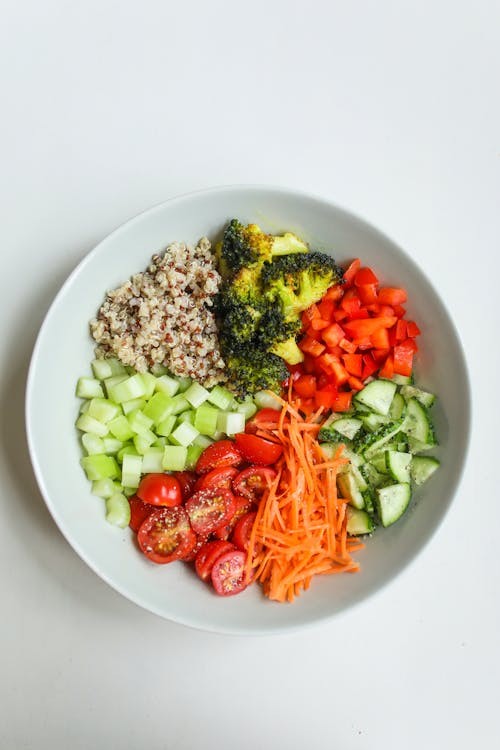Why Do I Crave Sweets is a question many people ask, reflecting a common desire for sugary treats. This article, brought to you by WHY.EDU.VN, explores the various reasons behind these cravings, offering solutions to manage your sweet tooth and promote a healthier lifestyle. Dive in to discover how to balance your diet and control those urges for sugary goodness. We’ll also cover sugar addiction, cravings for sweets, and the science behind why we yearn for sugary foods.
1. Is Sugar Addiction a Real Phenomenon?
While the term “sugar addiction” is frequently used, it’s essential to understand the science behind it. Many people describe their intense desire for sugary foods as an addiction, but is there a physiological basis for this?
1.1 The Neurological Impact of Sugar
Sugar consumption triggers the release of dopamine, a neurotransmitter associated with pleasure and reward, in the brain. This effect is similar to what is observed with addictive substances, leading to the idea of sugar being addictive. However, the extent to which sugar can create dependency is still a topic of debate among scientists.
| Neurotransmitter | Effect on Brain | Role in Cravings |
|---|---|---|
| Dopamine | Pleasure/Reward | Reinforces sugar consumption |
| Serotonin | Mood regulation | Influenced by carbohydrate intake |


1.2 Psychological Factors Contributing to Sugar Cravings
The psychological aspect of sugar cravings is significant. Many people associate sugary foods with comfort and emotional satisfaction. This can lead to a cycle of craving and consumption, especially during times of stress or emotional distress.
- Emotional Eating: Turning to sugary foods as a coping mechanism.
- Habitual Consumption: Developing a routine of consuming sweets at certain times of the day.
Visual appeal of sweets, often a contributing factor to sugar cravings.
2. The Downside of Excessive Sugar Intake
While an occasional treat won’t cause harm, consistently overindulging in sugary foods can lead to several health issues. Understanding these risks is crucial in managing your sugar cravings effectively.
2.1 Physiological Consequences of Too Much Sugar
Excessive sugar consumption has been linked to various health problems, impacting both physical and mental well-being.
- Weight Gain and Obesity: High sugar intake contributes to excess calorie consumption, leading to weight gain and obesity.
- Type 2 Diabetes: Overconsumption of sugar can lead to insulin resistance, increasing the risk of developing type 2 diabetes.
- Heart Disease: Studies have shown a correlation between high sugar intake and an increased risk of heart disease.
- Fatty Liver Disease: Excessive sugar can lead to the accumulation of fat in the liver, resulting in non-alcoholic fatty liver disease (NAFLD).
- Cognitive Decline: Research suggests that high sugar intake may negatively affect cognitive function and memory.
2.2 Mental Health Implications
The impact of sugar extends beyond physical health, affecting mood and mental well-being.
- Mood Swings: Rapid spikes and drops in blood sugar levels can lead to mood swings and irritability.
- Increased Risk of Depression: Some studies suggest a link between high sugar consumption and an increased risk of depression.
- Anxiety: Sugar can exacerbate symptoms of anxiety in some individuals.
3. Common Triggers for Sugar Cravings
Identifying the specific reasons behind your sugar cravings is the first step in managing them. There are several factors, both physical and emotional, that can trigger these cravings.
3.1 Biological Factors
Biological processes in the body can significantly influence your desire for sweets.
- Blood Sugar Imbalance: When blood sugar levels drop, the body craves a quick source of energy, often leading to sugar cravings.
- Hormonal Fluctuations: Hormones like ghrelin (the hunger hormone) and leptin (the satiety hormone) can affect cravings. Lack of sleep can disrupt these hormones, leading to increased sugar cravings.
- Nutrient Deficiencies: Sometimes, cravings can indicate a deficiency in certain nutrients.
3.2 Psychological and Emotional Factors
Emotional and psychological states play a significant role in triggering sugar cravings.
- Stress: Stress can trigger the release of cortisol, which may increase cravings for sugary and fatty foods.
- Emotional Eating: Using sweets as a way to cope with feelings of sadness, boredom, or anxiety.
- Habit: A regular habit of consuming sweets can create a conditioned response, leading to cravings at specific times.
- Comfort Foods: Association of certain sugary foods with positive memories or feelings of comfort.
3.3 Environmental Factors
External influences can also contribute to sugar cravings.
- Availability: Easy access to sugary foods in your environment (home, workplace) can increase temptation.
- Advertising: Marketing and advertising can influence cravings through visual and emotional appeals.
- Social Influences: Social situations, such as parties or gatherings, often involve sugary treats.
4. Effective Strategies to Curb Sugar Cravings
Once you understand the reasons behind your sugar cravings, you can start implementing strategies to manage them effectively.
4.1 Lifestyle Adjustments
Making changes to your daily routine can significantly reduce sugar cravings.
- Prioritize Sleep: Aim for 7-9 hours of quality sleep each night to regulate hunger hormones.
- Regular Exercise: Physical activity can improve mood, reduce stress, and help balance blood sugar levels.
- Stress Management Techniques: Practice relaxation techniques like meditation, yoga, or deep breathing to manage stress and reduce emotional eating.
4.2 Dietary Changes
Modifying your diet can help stabilize blood sugar levels and reduce cravings.
- Balanced Meals: Include protein, healthy fats, and complex carbohydrates in each meal to slow digestion and keep you full longer.
- Regular Meal Times: Eating every 3-4 hours can prevent significant drops in blood sugar levels.
- Hydration: Drink plenty of water throughout the day, as dehydration can sometimes mimic hunger.
- Fiber-Rich Foods: Incorporate foods high in fiber, such as fruits, vegetables, and whole grains, to promote satiety and stabilize blood sugar.
- Avoid Artificial Sweeteners: While they may seem like a good alternative, artificial sweeteners can sometimes increase sugar cravings.
| Strategy | Description | Benefits |
|---|---|---|
| Balanced Meals | Protein, healthy fats, complex carbs at each meal | Stabilizes blood sugar, promotes satiety |
| Regular Meals | Eating every 3-4 hours | Prevents significant drops in blood sugar |
| Hydration | Drinking plenty of water | Can reduce the urge to eat due to misinterpreting thirst for hunger |
| Fiber-Rich Foods | Fruits, vegetables, whole grains | Promotes satiety, helps stabilize blood sugar |
| Quality Sleep | Aim for 7-9 hours nightly | Regulates hunger hormones, reducing cravings |
| Regular Exercise | Physical activity | Improves mood, manages stress, balances blood sugar |
| Stress Mgmt | Meditation, yoga, deep breathing | Reduces emotional eating, promotes overall well-being |
| Healthy Swaps | Choose fruit over candy, Greek yogurt over ice cream | Reduces sugar intake without sacrificing taste |
4.3 Mindful Eating
Practicing mindful eating can help you become more aware of your cravings and make healthier choices.
- Pay Attention to Hunger Cues: Eat when you’re truly hungry, not just when you’re bored or emotional.
- Savor Each Bite: Eat slowly and savor the taste and texture of your food.
- Avoid Distractions: Turn off the TV and put away your phone while eating to focus on your meal.
- Listen to Your Body: Stop eating when you feel satisfied, not overly full.
4.4 Healthy Swaps
Finding healthier alternatives to sugary treats can satisfy your cravings without derailing your health goals.
- Fruit: Naturally sweet and packed with nutrients.
- Greek Yogurt with Berries: Provides protein and antioxidants.
- Dark Chocolate (70% cocoa or higher): Contains less sugar and more antioxidants than milk chocolate.
- Homemade Trail Mix: Combine nuts, seeds, and dried fruit for a satisfying snack.
- Smoothies: Blend fruits, vegetables, and protein powder for a nutritious and customizable treat.
4.5 Seek Professional Support
If you find it challenging to manage your sugar cravings on your own, consider seeking professional help.
- Nutritionist: Can provide personalized dietary advice and help you develop a healthy eating plan.
- Therapist: Can help you address emotional eating and develop coping strategies for stress and anxiety.
- Health Coach: Can provide support and motivation to help you achieve your health goals.
5. The Role of WHY.EDU.VN in Addressing Your Health Questions
At WHY.EDU.VN, we understand the complexities of health and wellness. Our mission is to provide clear, reliable, and expert-backed information to help you make informed decisions about your health.
5.1 Expert-Backed Information
All content on WHY.EDU.VN is thoroughly researched and reviewed by experts in their respective fields. We ensure that our information is accurate, up-to-date, and based on scientific evidence.
5.2 Addressing Complex Health Questions
We tackle a wide range of health questions, breaking down complex topics into easy-to-understand information. Whether you’re wondering about nutrition, fitness, mental health, or chronic conditions, WHY.EDU.VN is your go-to resource.
5.3 Connecting You with Experts
If you have specific health concerns or questions, WHY.EDU.VN can connect you with qualified professionals who can provide personalized guidance. Our network includes nutritionists, therapists, health coaches, and medical experts.
Fruits as a healthy alternative to processed sweets.
6. Real-Life Examples and Success Stories
Hearing about others’ experiences can be incredibly motivating and provide practical insights into managing sugar cravings.
6.1 Case Study 1: Overcoming Emotional Eating
Sarah, 35, struggled with emotional eating for years. She would turn to sugary snacks whenever she felt stressed or overwhelmed. With the help of a therapist and a nutritionist, Sarah learned to identify her emotional triggers and develop healthier coping mechanisms. She replaced sugary snacks with fruit and nuts and started practicing mindfulness to manage her stress. Over time, Sarah was able to break her emotional eating habit and improve her overall well-being.
6.2 Case Study 2: Balancing Blood Sugar
Mark, 42, experienced frequent sugar cravings due to blood sugar imbalances. He worked with a nutritionist who helped him create a balanced meal plan that included protein, healthy fats, and complex carbohydrates. Mark also started eating regular meals and snacks to prevent significant drops in blood sugar. Within a few weeks, his sugar cravings decreased, and he felt more energized throughout the day.
6.3 Expert Insights
- Dr. Emily Carter, Nutritionist: “The key to managing sugar cravings is to understand the underlying causes and make gradual, sustainable changes. Focus on nourishing your body with whole foods and addressing any emotional or psychological factors that may be contributing to your cravings.”
- John Smith, Therapist: “Emotional eating is often a response to unmet emotional needs. By addressing these needs through therapy and developing healthier coping strategies, individuals can break free from the cycle of emotional eating and improve their overall mental health.”
7. Latest Research and Findings on Sugar Cravings
Staying updated with the latest scientific research can provide new insights and strategies for managing sugar cravings.
7.1 The Gut-Brain Connection
Recent studies have highlighted the role of the gut microbiome in influencing sugar cravings. The gut microbiota can affect brain function and behavior, including food preferences.
- Probiotics: Consuming probiotic-rich foods or supplements may help balance the gut microbiome and reduce sugar cravings.
- Prebiotics: Eating prebiotic-rich foods, such as garlic, onions, and bananas, can nourish beneficial gut bacteria and improve overall gut health.
7.2 The Impact of Sleep on Food Cravings
Research continues to emphasize the importance of sleep in regulating hunger hormones and reducing food cravings.
- Melatonin: Maintaining a regular sleep schedule and creating a relaxing bedtime routine can help improve sleep quality and reduce sugar cravings.
- Blue Light: Avoiding blue light from electronic devices before bed can promote better sleep and hormone regulation.
7.3 Studies on Specific Nutrients
Some studies suggest that certain nutrients may help reduce sugar cravings.
- Magnesium: Magnesium deficiency has been linked to increased sugar cravings. Consuming magnesium-rich foods, such as leafy greens, nuts, and seeds, may help reduce cravings.
- Chromium: Chromium is involved in regulating blood sugar levels and may help reduce sugar cravings in some individuals.
8. Practical Tips for Daily Life
Integrating practical tips into your daily routine can make managing sugar cravings more manageable and sustainable.
8.1 Meal Planning
Planning your meals ahead of time can help you make healthier choices and avoid impulsive decisions when cravings strike.
- Create a Weekly Meal Plan: Include balanced meals and snacks that incorporate protein, healthy fats, and complex carbohydrates.
- Prepare Meals in Advance: Batch cooking or meal prepping can save time and ensure that you have healthy options readily available.
- Pack Healthy Snacks: Keep healthy snacks on hand to avoid reaching for sugary treats when hunger strikes.
8.2 Grocery Shopping Strategies
Making smart choices at the grocery store can significantly impact your sugar intake.
- Read Nutrition Labels: Pay attention to the added sugar content in packaged foods and choose options with lower sugar levels.
- Shop the Perimeter: Focus on fresh produce, lean proteins, and whole grains, which are typically located around the perimeter of the grocery store.
- Avoid the Candy Aisle: Steer clear of the candy and snack aisles to reduce temptation.
8.3 Social Situations
Navigating social situations can be challenging when trying to manage sugar cravings.
- Plan Ahead: If you know you’ll be attending a party or gathering, plan what you’ll eat in advance.
- Bring a Healthy Dish: Offer to bring a healthy dish to share, so you know there will be at least one nutritious option available.
- Be Mindful: Practice mindful eating and enjoy small portions of your favorite treats without overindulging.
- Communicate Your Needs: Don’t be afraid to communicate your dietary needs to friends and family.
9. Frequently Asked Questions (FAQ) About Sugar Cravings
Here are some common questions people have about sugar cravings:
- Why do I crave sweets after a meal? This could be due to habit, blood sugar fluctuations, or emotional associations.
- Are sugar cravings a sign of a nutrient deficiency? Sometimes, cravings can indicate a deficiency in certain nutrients, such as magnesium or chromium.
- Can stress cause sugar cravings? Yes, stress can trigger the release of cortisol, which may increase cravings for sugary and fatty foods.
- How can I stop sugar cravings at night? Ensure you have a balanced dinner with protein, healthy fats, and complex carbohydrates. Avoid screen time before bed and try relaxing activities like reading or meditation.
- Are artificial sweeteners a good alternative to sugar? While they may seem like a good option, artificial sweeteners can sometimes increase sugar cravings in the long run.
- How long does it take to reduce sugar cravings? It varies from person to person, but with consistent effort and healthy habits, you may start to see a reduction in cravings within a few weeks.
- Can hormonal changes affect sugar cravings? Yes, hormonal fluctuations during menstruation or pregnancy can affect sugar cravings.
- What are some healthy snacks to satisfy a sweet tooth? Fruits, Greek yogurt with berries, dark chocolate, and homemade trail mix are all great options.
- Should I completely eliminate sugar from my diet? It’s not necessary to completely eliminate sugar, but reducing added sugar intake can significantly improve your health.
- When should I seek professional help for sugar cravings? If you find it challenging to manage your cravings on your own or if they are significantly impacting your quality of life, consider seeking help from a nutritionist, therapist, or health coach.
10. Take Action Today with WHY.EDU.VN
Understanding why you crave sweets is the first step toward managing your sugar intake and improving your overall health. Remember, you’re not alone in this journey. At WHY.EDU.VN, we’re here to support you every step of the way.
10.1 Your Questions Answered
Still have questions about sugar cravings or other health concerns? Our platform is designed to provide you with the answers you need.
10.2 Connect with Experts
Want personalized guidance from a nutritionist, therapist, or health coach? We can connect you with qualified professionals who can help you achieve your health goals.
10.3 Join Our Community
Share your experiences, ask questions, and connect with others who are on a similar journey.
Don’t let sugar cravings control your life.
Visit WHY.EDU.VN today to take control of your health and well-being. Our team of experts is ready to provide detailed, easy-to-understand answers and connect you with professionals who can offer personalized guidance.
Address: 101 Curiosity Lane, Answer Town, CA 90210, United States
Whatsapp: +1 (213) 555-0101
Website: WHY.EDU.VN
Healthy snack options to combat sugar cravings.
By understanding the reasons behind your sugar cravings and implementing effective strategies to manage them, you can take control of your health and well-being. Remember, it’s okay to indulge in a sweet treat occasionally, but moderation is key. With the support of why.edu.vn, you can make informed decisions and achieve your health goals.
